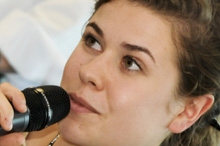Community Emergency Network

Caitria O’Neill is being honored as a Champion of Change for applying her tech skills for civic good.
I’m the CEO of Recovers, a disaster preparedness and recovery technology company based in San Francisco. We help communities, local government, and insurance agencies mitigate risk and recover from disasters.
I was standing in the front yard of my home in Monson, MA when a twister swept through town in June of 2011. The EF3 tornado scraped up whole neighborhoods and left my own home uninhabitable. In the aftermath, my sister Morgan and I got involved connecting local volunteers and donation offers to neighbors with needs at the First Church of Monson. Our seat-of-the-pants system for volunteer and case management was rough, but thanks to the work of many dedicated local leaders, it was able to meet needs no other organization could respond to.
What we accomplished in Monson isn’t unusual. In every area, after every disaster, ordinary people want to get involved putting their communities back together. But instead of stopping with Monson’s recovery, Alvin Liang, Morgan O’Neill, Chris Kuryak and I tried to scale what worked. We’ve spent the past two years turning best practices in local preparedness and recovery into an easy-to-use software toolkit for communities. From suburban Texas to Moore, OK, we’ve helped hundreds of thousands of people find information, aid, and ways to pitch in.
Technology is only part of the problem we’ve addressed. Many barriers to local participation are institutional. Large aid organizations are accustomed to sending people home in order to protect both volunteers and first responders. That makes sense for large organizations with big budgets. But if there is only about a week of media interest, and all local responders are sent home in that time, the community has no resource pool to draw upon in later recovery. By giving residents tools and permission to start organizing, we’re giving them a head start on recovery.
Making cleanup more efficient post-disaster is just the beginning; we are working to reduce the damage disasters cause. When working with communities before disasters, we focus on creating a community emergency network of neighbors that can respond to events of any size. While traditional preparedness focuses on individual households, we believe risk and resources should be measured as a community. After all, a single generator can power dozens of cell phones in an outage, and a single blocked storm-drain can flood a dozen houses.
We are proud to be honored as White House Champions of Change. We are happy to be able to support the amazing men and women working in recovering communities across the United States, and we are excited to support the next generation of community preparedness.
Caitria O’Neill is a co-founder of Recovers
White House Blogs
- The White House Blog
- Middle Class Task Force
- Council of Economic Advisers
- Council on Environmental Quality
- Council on Women and Girls
- Office of Intergovernmental Affairs
- Office of Management and Budget
- Office of Public Engagement
- Office of Science & Tech Policy
- Office of Urban Affairs
- Open Government
- Faith and Neighborhood Partnerships
- Social Innovation and Civic Participation
- US Trade Representative
- Office National Drug Control Policy
categories
- AIDS Policy
- Alaska
- Blueprint for an America Built to Last
- Budget
- Civil Rights
- Defense
- Disabilities
- Economy
- Education
- Energy and Environment
- Equal Pay
- Ethics
- Faith Based
- Fiscal Responsibility
- Foreign Policy
- Grab Bag
- Health Care
- Homeland Security
- Immigration
- Innovation Fellows
- Inside the White House
- Middle Class Security
- Open Government
- Poverty
- Rural
- Seniors and Social Security
- Service
- Social Innovation
- State of the Union
- Taxes
- Technology
- Urban Policy
- Veterans
- Violence Prevention
- White House Internships
- Women
- Working Families
- Additional Issues

